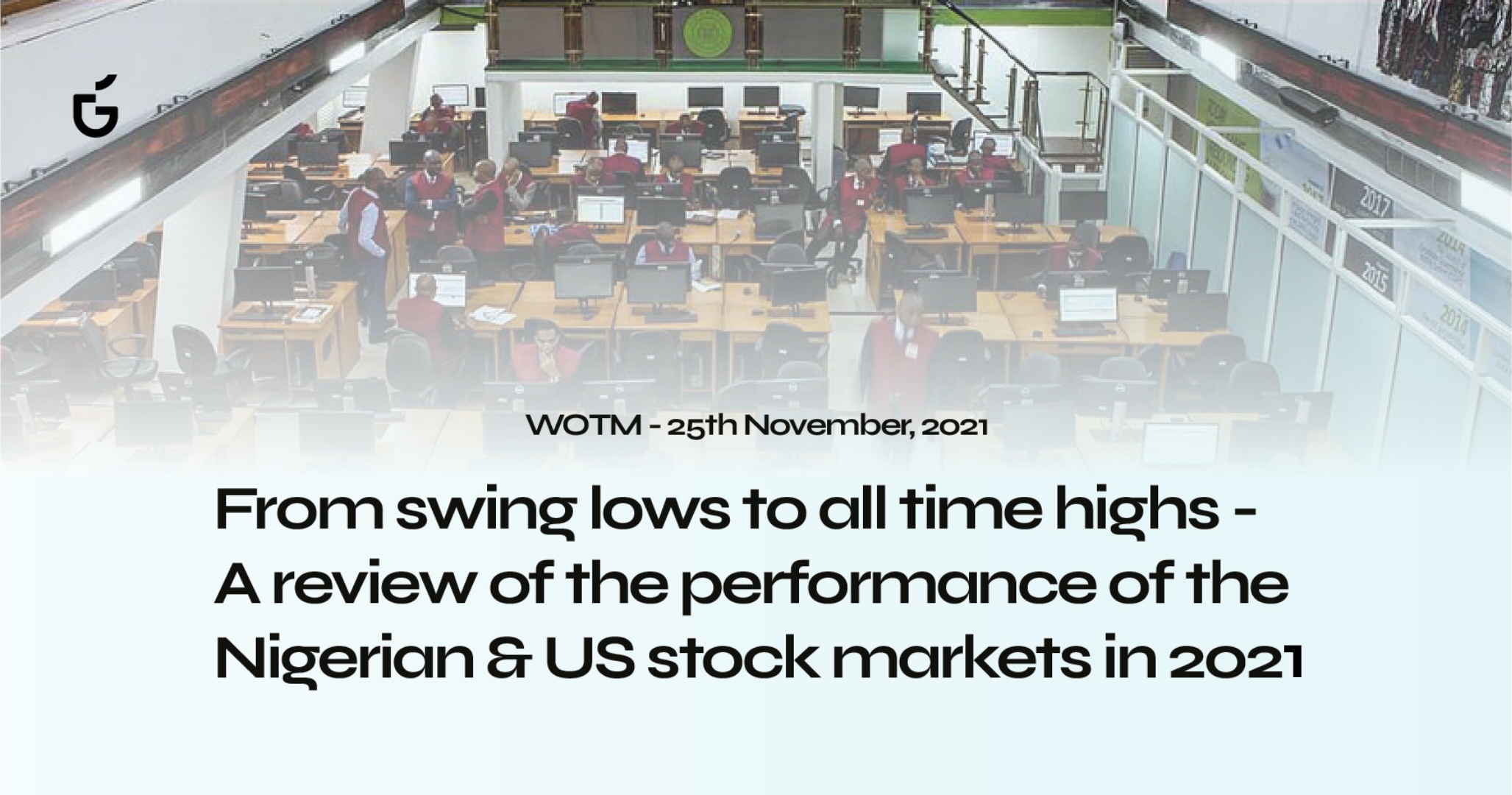 Africa
AfricaUnderstanding how companies are valued – A look into the MainOne acquisition
15 December, 2021
30 September, 2021 | 4 MINS READ
The Stories
An inclement summer together with suspected manipulations of oil production in Russia, kick-started the energy crunch in Europe. Europe depends on Norway and Russia for about 55% of its gas supply, both countries’ inability to meet supply demands has led to a gas supply shortage in Europe.
In the UK, a mix of high gas prices, low wind energy, Brexit, and a cap on energy prices has led to a significantly low supply of energy. A few energy companies in the UK have reportedly gone bust, while others are on the verge of bankruptcy, leaving almost 1 million customers without an energy provider.
China is fighting a gas supply shortage and the environmental effects of the use of energy in production by rationing and restricting energy usage. Factories are forced to shut down production, and retail energy consumers are putting off air conditioners to comply with new energy regulations.
On Friday, the 24th of September 2021, ten of China’s major regulators declared cryptocurrency activities illegal in China. Chinese banks are prohibited from opening accounts with crypto exchanges or crypto-related entities. The ban also forbids crypto exchanges outside China from providing crypto-related services to Chinese citizens.
The European Energy Crunch
Europe has since the beginning of September grappled with an energy crisis. Its energy problems stem from the increased demand for energy as summer wasn’t as hot as expected and the shortage in supply of natural gas from Russia and Norway.
This had led to a significant rise in electricity prices in a number of European countries. For example, in Spain electricity prices have risen by 35% in the last year. The Netherlands has hinted that should the energy shortage continue, it will be forced to partially reopen the Groningen gas field (a gas field that led to a 3.4 magnitude earthquake in 2018). The plan before now was to completely shut down Groningen by 2023, which seem unlikely with the ongoing energy crisis.
Electric intensive industries like steel/aluminum, fertilizers, and chemical production are being threatened with a possible shutdown if the energy situation doesn’t improve.
The UK’s Energy Price Cap
In the UK, the energy crisis feeds on a mix of a rise in gas prices, government-controlled energy prices, low wind energy, and Brexit.
In the past year, gas prices have risen by about 420% moving from a little over $5 to over $27 per million British thermal units. The rise in the cost of gas met energy companies unprepared.
At the beginning of the year, the UK had 70 energy providers, 7 of these companies are no longer in existence and a couple of others are on the verge of bankruptcy. The energy market regulator in the UK in 2017 set the maximum price energy consumers should pay for energy usage. This was done to protect consumers from the volatile nature of energy prices. While the price cap was put in place, there were no subsidies to help energy providers hedge against increases in energy prices in the international market.
Wind energy which accounts for 25% of the UK’s energy supply has dropped to 7%. Companies and individuals alike are feeling the pinch of the energy crisis as the UK government has refused to bail out struggling companies in the industry. The price cap is reviewed every 6 months and a review is expected by October 1st, 2021, but even the upward price review isn’t expected to capture already increased prices.
The situation is worsened by Brexit. Brexit has led to a shortage of drivers of heavy goods vehicles (HGV) in the UK. This has disrupted the supply chain and led to the closure of petrol stations owned by ExxonMobil and British Petroleum. This comes on the back of difficult entry procedures into the UK by HGV drivers from other European countries.
The situation with energy providers has left almost a million energy consumers without an energy provider.
Energy Rationing in China
In China, high gas prices, the need to curtail gas emission, and cut down on energy consumption has led to regulatory clampdowns in different sectors of the Chinese economy.
The recent restrictions on energy usage in China has led to a shut down of production plants and the switching off of streetlights and air conditioners in some parts of China. Some of these companies produce components for Apple, Tesla, Intel, Qualcomm, etc. The recent clampdown on cryptocurrencies is connected to China’s need to cut down on energy consumption as the mining of crypto is energy-consuming.
Besides high gas prices, China is looking to host the Winter Olympics in February 2022 and the government intends to use that as an opportunity to show the world its on its way to becoming carbon neutral by 2060. Despite projected lower GDP growth resulting from the energy rationing.
Implications of the Energy Crisis on the World Economy
Though European and Asian countries seem to be at the forefront of the ongoing crisis, it is soon becoming a global challenge. Already, the scarcity in these parts of the world has driven up crude oil prices and a continuous rise in gas prices. As winter approaches and economies start to recover from the effect of the delta variant of the coronavirus, we’ll see an increased demand for energy. Given the existing gas shortage, crude oil seems the only viable substitute as wind and solar have proven to be deficient.
Though America is more energy independent than its European counterparts, local gas producers would favor exports over the local market given attractive prices. It may require government intervention for local gas producers to prioritize the US market over exports.
Rising energy prices have inflationary implications. Given existing worries about growing inflation, higher gas and crude oil prices will push inflation further, which may lead to an earlier than expected tapering of loose monetary policies. High-interest rate is negative for the stock market.
The situation in China is negative for the already disrupted global supply chain. Should these factories be closed for long, scarcity of products ranging from textiles to electronic components will persist. This has inflationary and unemployment implications, both of which are negative for the world economy.
What the Energy Crisis Means for Nigeria.
Oil-producing countries like Nigeria are poised to benefit from the rise in energy prices. Given the fact that crude oil still accounts for over 90% of Nigeria’s foreign exchange revenue, the energy crisis is positive for Nigeria.
But pump price of oil in Nigeria is still heavily subsidized and the size of the subsidy grows as oil prices increase in the international market. This eats into foreign exchange revenue from the sale of crude oil. Notwithstanding, the government’s foreign exchange revenue from its oversubscribed Eurobond together with earnings from crude oil, can be channeled towards providing liquidity at the Nigerian Autonomous Foreign Exchange Rate Fixing Methodology (NAFEX) window. Clearing up of FX backlogs and maintaining liquidity at the official foreign exchange window might ease the pressure on the naira in the parallel market.
The energy crisis also presents an opportunity for Nigeria to grow its foreign exchange earnings with the export of coal. Coal is one of the untapped mineral resources in Nigeria and given the demand for coal in the global market, Nigeria can improve its foreign exchange earning in this season ramping up local coal production and export.
What the Energy Crisis Means for Me as an Investor
As it is, the energy crisis looks set to drive up inflation which would, in turn, raise interest rates. Higher interest rates are negative for stock markets. The prolonged closure of production factories would have a negative effect on company earnings which is also negative for the stock market.
Oil & gas stocks are however poised to benefit from higher energy prices as we’ve already seen a couple of share price gains from the recent rise in oil prices. (Ring energy’s share price has gained 11% in the last 5 days, while Range resources gained 9% within the same time frame).
The energy crisis has however made it glaring that continuous supply of hydrocarbon (natural gas and fuels) is essential to the survival of the global economy. Discarding the use of hydrocarbon threatens energy supply and has lasting implications on food and other primary sectors. Fertilizer and steel factories are the first hits as we’ve already seen in China and Europe.
 Africa
Africa15 December, 2021
 Africa
Africa09 December, 2021
Join the biggest
investment club in Nigeria.